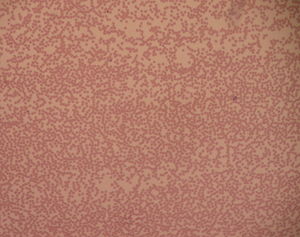What does neutropenia mean?
Definitions for neutropenia
ˌnu trəˈpi ni ə, ˌnyu-neu·trope·ni·a
This dictionary definitions page includes all the possible meanings, example usage and translations of the word neutropenia.
Princeton's WordNet
neutropenianoun
leukopenia in which the decrease is primarily in number of neutrophils (the chief phagocytic leukocyte)
Wiktionary
neutropenianoun
A hematological disorder characterized by an abnormally low neutrophil count.
Etymology: neutral + -penia
Wikipedia
Neutropenia
Neutropenia is an abnormally low concentration of neutrophils (a type of white blood cell) in the blood. Neutrophils make up the majority of circulating white blood cells and serve as the primary defense against infections by destroying bacteria, bacterial fragments and immunoglobulin-bound viruses in the blood. People with neutropenia are more susceptible to bacterial infections and, without prompt medical attention, the condition may become life-threatening (neutropenic sepsis).Neutropenia can be divided into congenital and acquired, with severe congenital neutropenia (SCN) and cyclic neutropenia (CyN) being autosomal dominant and mostly caused by heterozygous mutations in the ELANE gene (neutrophil elastase). Neutropenia can be acute (temporary) or chronic (long lasting). The term is sometimes used interchangeably with "leukopenia" ("deficit in the number of white blood cells").Decreased production of neutrophils is associated with deficiencies of vitamin B12 and folic acid, aplastic anemia, tumors, drugs, metabolic disease, nutritional deficiency and immune mechanisms. In general, the most common oral manifestations of neutropenia include ulcer, gingivitis, and periodontitis. Agranulocytosis can be presented as whitish or greyish necrotic ulcer in oral cavity, without any sign of inflammation. Acquired agranulocytosis is much more common than the congenital form. The common causes of acquired agranulocytosis including drugs (non-steroidal anti-inflammatory drugs, antiepileptics, antithyroid and antibiotics) and viral infection. Agranulocytosis has a mortality rate of 7–10%. To manage this, the application of granulocyte colony stimulating factor (G-CSF) or granulocyte transfusion and the use of broad-spectrum antibiotics to protect against bacterial infections are recommended.
ChatGPT
neutropenia
Neutropenia is a medical condition characterized by an abnormally low level of neutrophils, which are a type of white blood cells that play a crucial role in fighting off infections in the body, particularly those caused by bacteria and fungi. This condition makes a person more susceptible to infectious diseases. It can be caused by various factors, including certain diseases such as leukemia or infections, drug treatments, or congenital disorders. Its severity varies, and it can occasionally be life-threatening if left untreated.
Wikidata
Neutropenia
Neutropenia, occasionally spelled neutropaenia or neutropoenia, from Latin prefix neutro- and Greek suffix -πενία, is a granulocyte disorder characterized by an abnormally low number of neutrophils. Neutrophils usually make up 50-70% of circulating white blood cells and serve as the primary defense against infections by destroying bacteria in the blood. Hence, patients with neutropenia are more susceptible to bacterial infections and, without prompt medical attention, the condition may become life-threatening. Neutropenia can be acute or chronic depending on the duration of the illness. A patient has chronic neutropenia if the condition lasts for longer than three months. It is sometimes used interchangeably with the term leukopenia, as neutrophils are the most abundant leukocytes, but neutropenia is more properly considered a subset of leukopenia as a whole. There are numerous causes of neutropenia that can roughly be divided between either problems in the production of the cells by the bone marrow and destruction of the cells elsewhere in the body. Treatment depends on the nature of the cause, and emphasis is placed on the prevention and treatment of infection.
U.S. National Library of Medicine
Neutropenia
A decrease in the number of neutrophilic leukocytes in the blood. (Dorland, 27th ed)
Matched Categories
Usage in printed sourcesFrom:
- [["1914","8"],["1915","4"],["1916","1"],["1917","1"],["1919","1"],["1920","31"],["1922","2"],["1923","2"],["1925","1"],["1927","1"],["1929","85"],["1930","3"],["1931","1"],["1933","24"],["1934","7"],["1935","108"],["1936","56"],["1937","52"],["1938","118"],["1939","79"],["1940","46"],["1941","131"],["1942","59"],["1943","132"],["1944","75"],["1945","56"],["1946","202"],["1947","58"],["1948","122"],["1949","86"],["1950","223"],["1951","150"],["1952","245"],["1953","181"],["1954","78"],["1955","162"],["1956","276"],["1957","278"],["1958","348"],["1959","131"],["1960","492"],["1961","539"],["1962","195"],["1963","310"],["1964","573"],["1965","684"],["1966","716"],["1967","496"],["1968","820"],["1969","602"],["1970","898"],["1971","990"],["1972","843"],["1973","614"],["1974","1218"],["1975","1083"],["1976","1270"],["1977","973"],["1978","1378"],["1979","1556"],["1980","1686"],["1981","1241"],["1982","1672"],["1983","1881"],["1984","2767"],["1985","2217"],["1986","3010"],["1987","2344"],["1988","2915"],["1989","2766"],["1990","3237"],["1991","3322"],["1992","4624"],["1993","4213"],["1994","4560"],["1995","5221"],["1996","4847"],["1997","5137"],["1998","7223"],["1999","6222"],["2000","6337"],["2001","10962"],["2002","8705"],["2003","9986"],["2004","9675"],["2005","9543"],["2006","9642"],["2007","7829"],["2008","8247"]]
Anagrams for neutropenia »
enantiopure
Numerology
Chaldean Numerology
The numerical value of neutropenia in Chaldean Numerology is: 4
Pythagorean Numerology
The numerical value of neutropenia in Pythagorean Numerology is: 3
Popularity rank by frequency of use
Translations for neutropenia
From our Multilingual Translation Dictionary
- العدلاتArabic
Get even more translations for neutropenia »
Translation
Find a translation for the neutropenia definition in other languages:
Select another language:
- - Select -
- 简体中文 (Chinese - Simplified)
- 繁體中文 (Chinese - Traditional)
- Español (Spanish)
- Esperanto (Esperanto)
- 日本語 (Japanese)
- Português (Portuguese)
- Deutsch (German)
- العربية (Arabic)
- Français (French)
- Русский (Russian)
- ಕನ್ನಡ (Kannada)
- 한국어 (Korean)
- עברית (Hebrew)
- Gaeilge (Irish)
- Українська (Ukrainian)
- اردو (Urdu)
- Magyar (Hungarian)
- मानक हिन्दी (Hindi)
- Indonesia (Indonesian)
- Italiano (Italian)
- தமிழ் (Tamil)
- Türkçe (Turkish)
- తెలుగు (Telugu)
- ภาษาไทย (Thai)
- Tiếng Việt (Vietnamese)
- Čeština (Czech)
- Polski (Polish)
- Bahasa Indonesia (Indonesian)
- Românește (Romanian)
- Nederlands (Dutch)
- Ελληνικά (Greek)
- Latinum (Latin)
- Svenska (Swedish)
- Dansk (Danish)
- Suomi (Finnish)
- فارسی (Persian)
- ייִדיש (Yiddish)
- հայերեն (Armenian)
- Norsk (Norwegian)
- English (English)
Word of the Day
Would you like us to send you a FREE new word definition delivered to your inbox daily?
Citation
Use the citation below to add this definition to your bibliography:
Style:MLAChicagoAPA
"neutropenia." Definitions.net. STANDS4 LLC, 2024. Web. 31 Oct. 2024. <https://www.definitions.net/definition/neutropenia>.



Discuss these neutropenia definitions with the community:
Report Comment
We're doing our best to make sure our content is useful, accurate and safe.
If by any chance you spot an inappropriate comment while navigating through our website please use this form to let us know, and we'll take care of it shortly.
Attachment
You need to be logged in to favorite.
Log In